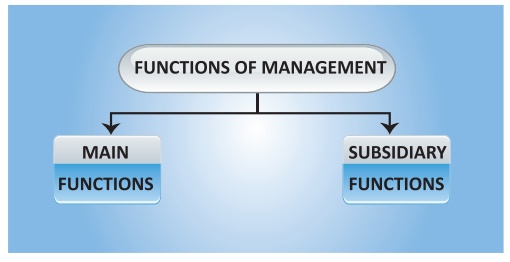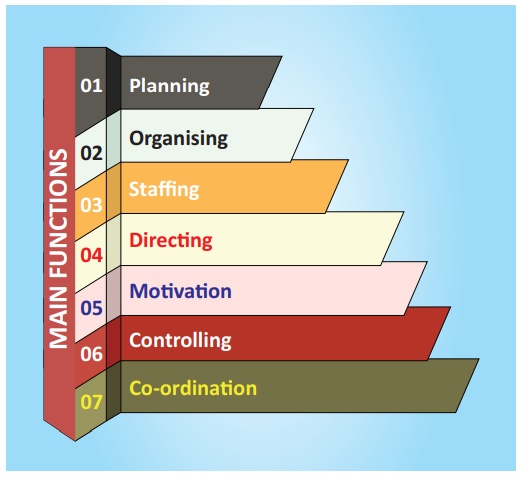Commerce - Main Functions of management | 12th Commerce : Chapter 2 : Management Process : Functions of Management
Chapter: 12th Commerce : Chapter 2 : Management Process : Functions of Management
Main Functions of management

Main Functions of management
Planning, Organising, Staffing, Directing,
Motivating, Controlling and Co-ordination are the main functions of management.

1. Planning
Think Before you Act‘ or 'Look Before you Leap' are
some of the usual traditional proverbs; which provide a basis or logic for
planning. Planning is the primary function of management. Nothing can be performed
without planning. (For eg., Writing a book starts with planning). In short,
planning refers to deciding in advance. Planning is a constructive reviewing of
future needs so that present actions can be adjusted in view of the established
goal. Planning should take place before doing; most individual or group efforts
are made by determining before any operative action takes place, what shall be
done, where, how and who shall do it.
2. Organising
Organising is the process of establishing
harmonious relationship among the members of an organisation and the creation
of network of relationship among them. Organising function work is assigned to
employees who are given authority to carry out the work assigned and made
accountable for it.
3. Staffing
Staffing function comprises the activities of
selection and placement of competent personnel. In other words, staffing refers
to
Staffing includes selection of right persons, training to those needy persons,
promotion of best persons, retirement of old persons, performance appraisal of
all the personnel, and adequate remuneration of personnel. The success of any
enterprise depends upon the successful performance of staffing function.
4. Directing
Directing denotes motivating, leading, guiding and
communicating with subordinates on an ongoing basis in order to accomblish
pre-set goals. Employees are kept informed of all necessary matters by
circulars, instructions manuals, newsletters, notice-boards, meeting, participative
mechanism etc., in order to enable the employees to accomplish the
organizational goals.
5. Controlling
Controlling is performed to evaluate the
performance of employees and deciding increments and promotion decisions. The
control function helps in identifying under performers and arranging remedial
training for them. It is the control function which facilitates synchronization
of actual performance with predetermined standards.
6. Co-ordination
Co-ordination is the synchronization (or
unification or integration) of the actions of all individuals, working in the
enterprise in different capacities; so as to lead to the most successful
attainment of the common objectives. Co-ordination is included in every
managerial function; Eg (i) Planning and co-ordination, (ii).Organising and
co-ordination, (iii) Staffing and co-ordination, (iv) Directing and
co-ordination, (v) Motivation and co-ordination and (iv) Controlling and
co-ordination.
All the activities are divided groupwise or
sectionwise under organising function. Now, such grouped activities are
co-ordinated towards the accomplishment of objectives of an organisation. The
difficulty of co-ordination depends upon the size of organisation. The
difficulty of co-ordination is increased with the increasing size of the
organisation.
7. Motivating
The goals are achieved with the help of motivation.
Motivation includes increasing the speed of performance of a work and
developing a willingness on the part of workers. This is done by a resourceful
leader. The workers expect, favourable climate conditions to work, fair
treatment, monetary or non-monetary incentive, effective communication and
gentleman approach.
“ Passing the buck, the buck stops here”
To shift or reassign the blame or responsibility (for something) to another person, group, or thing.
Related Topics